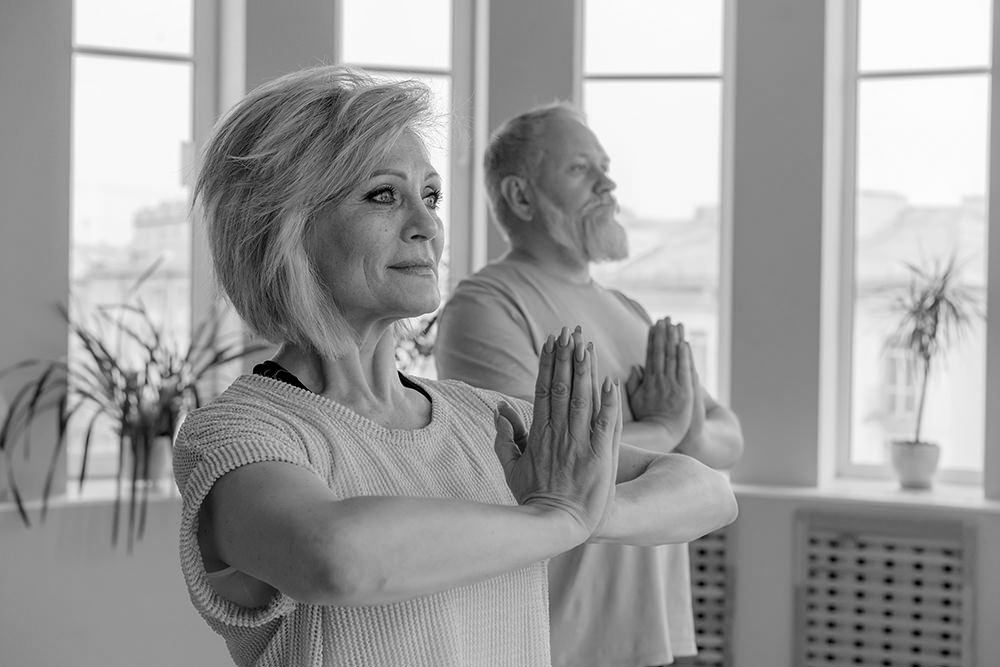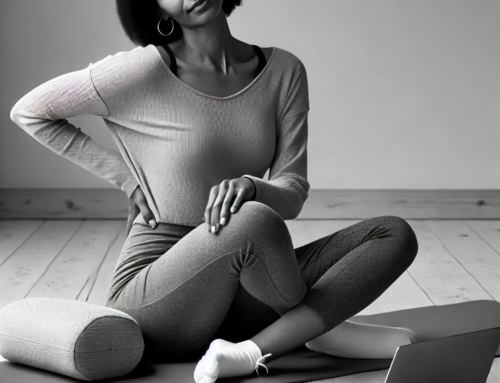Living with a chronic illness, we can often feel like we have nowhere else to turn. We’ve tried doctors everywhere, holistic practitioners, books, social media, but can’t seem to find what we’re looking for. That’s because the answers don’t lie outside of us—they lie within us. As someone living with a chronic illness that has no cure, I get it. I’ve been there.
Luckily, we have therapeutic yoga methods for chronic illness and techniques to connect us to that inner wisdom
In our continued yogic practices, we work on full acceptance of what is, without judgment. As we expand our awareness with compassion, to get to that place, we first begin with observation, noting how we feel. Then we’re able to identify the many ups and downs of living with chronic illness and pain, labeling the “good” and “bad” days and how chronic illness and pain interact with the many layers of our being. I’ve found that giving myself permission to judge how I feel is the entry point to full acceptance.
The labeling of the judgment was an important part of the path for me. We ultimately want to get to a place where we’re not clinging to the good days and we don’t have aversion to the bad days. We want to welcome all days and the full spectrum of how we feel when living with a chronic illness and pain, without attaching to or resisting any of it. But before we get there, we rely on judgment of “good” days and “bad” days to help move us into acceptance of all shades, moods and colors of living with a chronic illness and pain before we release judgment of it. In that release of the judgment, we enter full acceptance of what is and full acceptance of ourselves as we are, without needing to be fixed or changed, or believing that we are broken or damaged. It’s in the release of needing something to be different that we find relief and lasting peace.
Our good days
You’re probably familiar with them. We could classify a “good” day as one where we wake up easily, with energy, ready for the day. We’re able to address our needs, responsibilities and even get our regular daily practices in. It feels like a well-balanced day with plenty of self-care. At the end of the “good day,” pain and fatigue levels are low, the mind feels settled, so sleep comes with ease. We drift off, feeling productive and ready to shut down for the day.
Then another “good day” comes, and we wake refreshed, are creative, grateful and hopeful. We’re able to incorporate practices to end the day balanced once again. And “good day” after “good day,” we continue reaching into our arsenal of self-care methods to refresh, calm and balance. We ease in and out of the days with more inner connection, acceptance of what is and compassion for what we’re feeling.
What about when we don’t want to practice at all?
But what about the days when we fall out of the groove? What about the days we wake up late, realize that we forgot to make lunches and we have a mountain of work to catch up on? What about the days we feel sluggish, fatigued or when joint and muscle pain scream for our attention? What about the flare-up days, when symptoms rage out of control?
These days are aplenty when living with chronic illness and pain, but they bring with them an invitation. An invitation shift our perspective. An invitation to view our self-care in a radically different way. Let’s lean on the oldest continually practiced medical science that we know of to lead the way: Ayurveda. If I’ve already lost your interest, I promise that what I’m about to share is likely not what you’re expecting, especially when we combine Ayurvedic self-care techniques with yoga therapy for chronic illness.
Not too long ago, I had many preconceived notions of Ayurveda and dismissed it altogether, feeling as though it was time-consuming, inaccessible and complex. These “mainstream” ideas of what Ayurveda is, sold to me over and over by practitioners around me, closed my mind completely. But as I delved deeper into my yoga therapy studies—which include Ayurveda—my mind opened to a world of variety. I discovered accessible, inexpensive, ancient Ayurvedic self-care rituals that not only fit easily into my schedule, but also had positive effects in my day to day.
Self-care is really about caring for ourselves on a deeper level
By doing so, we nurture and maintain our spiritual connection, living with moral codes and taking responsibility. It becomes a way to connect fully with life and shapes our lives in a positive, mindful way instead of indulging or merely treating ourselves. It’s about regular dedication to ourselves, our evolution, lasting happiness and health.
Ayurveda for chronic illness
It’s waking up each day and taking in the energy of the sun before we reach for our phones and check emails, texts or to-do lists (Usha Pana).
It’s splashing cold water to rinse away sleep from our eyes and dreams from our consciousness (Netra Dhauti).
It’s about setting simple morning routines that connect us inward, bring us ease in the moment and over time and expand our awareness. Even on days when everything hurts and we can’t bear to move, we can still take a few breaths before transitioning, to connect to our witness consciousness (Atma Tattva Avalokanam).
As we unite Yoga Therapy for chronic illness and Ayurveda, we practice mindful movements of the major joints with slow breaths to increase circulation (Apana Kriyas). Simply noticing the shift of late afternoon to evening (Kala Sandhi Sakshitva), or washing the face, hands and feet before bed (Pancha Snana), are small additions that create large shifts within us. Over time, these accessible daily rituals become as easy to practice as brushing our teeth—which is another Ayurvedic self-care ritual that most of us already practice!
Incorporating Ayurvedic self-care rituals serves us with long-term inner connection, preventative methods and lasting expansion of consciousness. And in that expanded awareness, we’re kinder to ourselves on the days when we move a bit slower, need to stay in bed, have digestive flare-ups, feel hopeless or irritable from pain. That kindness ripples out to the ones we love and care for, bringing in acceptance of what is. In this acceptance, we know ourselves deeply and honor our needs to best serve our unique healing journeys with compassion. This is our power. This is within our control.
Work with me
I teach private, one-on-one therapeutic, gentle, restorative yoga therapy sessions in-person in Southington, CT or online via Zoom.
Book your session
Learn more about yoga therapy






